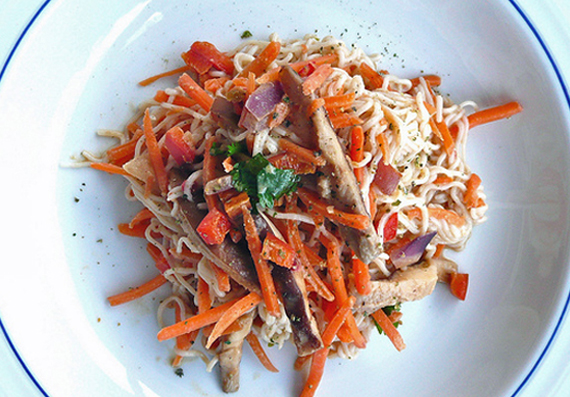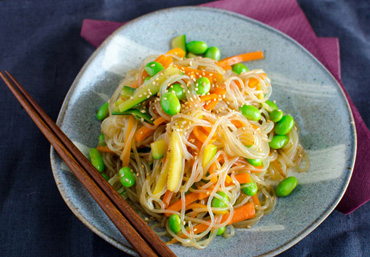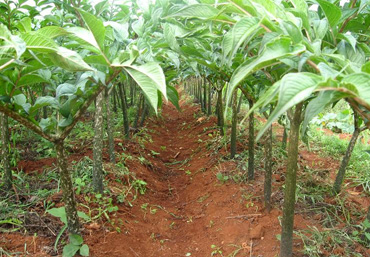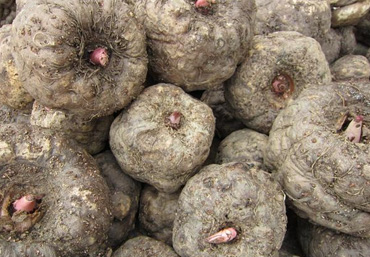The Konjac root is highly rich in positive vitamins, minerals and fiber. Besides its most beneficial nutritional quality of being high in fiber, Konjac contains vitamins such as iron, potassium, phosphorous selenium and calcium. The root also contains many types of essential amino acids and polyunsaturated fatty acids.
Konjac foods are an ideal food when it comes to satiety (feeling full). Glucomannan will increase up to 200 times of its original volume after absorbing water. This leads to the sensation of feeling full after consuming Konjac derived foods. Konjac also has the function of supplementing calcium, balancing salinity, cleaning stomach, clearing up intestine, and removing toxin inside body. Konjac can delay the absorption of glucose, effectively reducing postprandial blood sugar.
The main ingredient of the Konjac root is glucomannan fiber. Glucomannan fiber not only contains more than 16 types of amino acids but is a low-protein, low-fat, high-fiber food. Thus, Konjac can lower LDL cholesterol and blood sugar. Not only do the nutritional benefits of Konjac foods assist in a positive diet, consuming this dietary fiber can help you lose weight.

Glucomannan fiber in Konjac has excellent diabetic supporting effects such as increasing insulin in the blood and lowering blood sugar. Medical studies have shown that glucomannan fiber can control, prevent and treat diabetes in some cases. Konjac glucomannan is the most viscous dietary fiber, which can enhance gastrointestinal viscosity and delay the retention time of chyme. Konjac glucomannan helps to form the protective film in the intestinal wall and effectively reduces and postpones the absorption of glucose, inhibiting rise of blood sugar. Konjac glucomannan can also reduce free fatty acid levels in the blood, improving insulin sensitivity while lowering glucose tolerance. Konjac foods is an ideal food for diabetics since it can lower blood sugar, improve symptoms and effectively control the conditions of diabetes.
Konjac root has a protein content about of approximately 5% to 10%. With a total of 16 kinds of amino acids, seven of the amino acids found in the Konjac root are essential amino acids, required by the human body since they cannot be produced internally.
The Konjac root contains a number of essential minerals as well. Konjac root contains high amounts of potassium, calcium, magnesium, iron, and copper.
On average, dried crude Konjac flour contains between 49% to 60% Glucomannan fiber as the main carbohydrate. The remaining carbohydrate includes 10% to 30% starch, 2% to 5% insoluble fiber, 5% to 14% crude protein, 3% to 5% sugars and 3% to 5.3 ash (mineral content).
Konjac foods are alkaline food that provides several nutrients to the body. It contains water, protein, carbohydrate, lipids, sodium, potassium, magnesium, iron, phosphorus, copper, zinc, vitamin A, vitamin E, vitamin D, vitamin B1, vitamin B2, vitamin B6, vitamin B12, vitamin C, pantothenate, niacin, fatty acids, folic acid and dietary fiber.
With the numerous positive health benefits of Konjac foods, it is no surprise that the demand for this noodle continues to increase.
The Health Benefits of Konjac Foods
Medical research has shown that Konjac foods have many positive health benefits. Some of the benefits include:
After the Konjac fiber comes into contact with water in the stomach, the glucomannan fiber in the digestive tract helps to absorb bile acid. Contributing to the sensation of satiety, Konjac helps to achieve weight reduction when dieting. The glucomannan fiber also behaves as a prebiotic in the intestine for Lactobacillus bifidus growth.
Konjac fiber has very high water absorbent and expansion rate, it is very helpful for control blood sugar level, reduce cholesterol lever, weight loss.



Copyright © 2002 ~ 2017 KonjacFoods.com